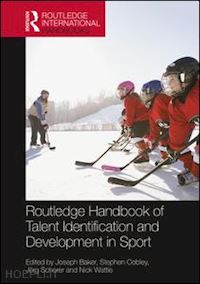Section I: Talent Identification 1. Talent Identification and Development in Sport: An introduction [Joseph Baker, Stephen Cobley, Jörg Schorer and Nick Wattie] 2. Does Talent Exist? Yes! [Dean Keith Simonton] 3. Does Talent Exist? A re-evaluation of the nature-nurture debate [Paul Ward, Patrick Belling, Erich Petushek and Joyce Ehrlinger] 4. Conceptions of Giftedness and Talent [Christiane Fischer-Ontrup and Christian Fischer] 5. How Contemporary International Perspectives Have Consolidated a Best-Practice Approach for Identifying and Developing Sporting Talent [Juanita R. Weissensteiner] 6. Why Conceptualizations of Talent Matter: Implications for Skill Acquisition and Talent Identification and Development [Nick Wattie and Joseph Baker] 7. On the Efficacy of Talent Identification and Talent Development Programmes [Arne Güllich and Stephen Cobley] 8. Applied Statistics for Practitioners and Researchers [Dirk Büsch and Urs Granacher] Section II: Talent Development 9. Sport Activity in Childhood: Early specialisation and diversification [Paul R. Ford and A. Mark Williams] 10. Method in the Madness: Working towards a viable ‘paradigm’ for better understanding and supporting the athlete pathway [Juanita R. Weissensteiner] 11. Talent Identification and Development in the Context of "Growing Up" [Robert M. Malina, Sean P. Cumming, Manuel J. Coelho e Silva and António J. Figueiredo] 12. Psychological Factors in Developing High Performance Athletes [Anne-Marie Elbe and Johan Wikman] 13. Family Influences on Talent Development in Sport [Camilla J. Knight] 14. Understanding Environmental and Task Constraints on Talent Development: Analysis of micro-structure of practice and macro-structure of development histories [Keith Davids, Arne Güllich, Richard Shuttleworth and Duarte Araújo] 15. Perceptual-Cognitive Training: The next piece of the puzzle [Florian Loffing, Norbert Hagemann and Damian Farrow] 16. Windows of Optimal Development [David I. Anderson and Anthony M. Mayo] 17. Could Sports Biomechanics Provide the Missing Pieces to the Talent Identification and Development Puzzle? [Paul Stephen Glazier] 18. Longitudinal Studies of Athlete Development: Their importance, methods and future considerations [Stephen Cobley and Kevin Till] Section III: Creating Optimal Environments 19. Creating Optimal Environments for Talent Development: An Holistic Ecological Approach [Kristoffer Henriksen and Natalia Stambulova] 20. On the (Potential) Value of Coaching [Steven B. Rynne, Bob Crudgington, Rebecca K. Dickinson and Clifford J. Mallett] 21. Group Cohesion and Athlete Development [Mark Eys, Todd M. Loughead and Michael Godfrey] 22. Applied Motor Learning: Optimal environments for successful development [Adam D. Gorman and Ian Renshaw] 23. Understanding Dropout in the Athlete Development Process [Carsten Hvid Larsen and Dorothee Alfermann] 24. A Smooth Sea Never Made a Skilful Sailor: Optimizing and exploiting the rocky road in talent development [Dave Collins and Áine MacNamara] Section IV: Health and Development Concerns 25. Understanding Underrecovery, Overtraining and Burnout in the Developing Athlete [Maximilian Pelka and Michael Kellmann] 26. Medical Perspectives on Talent Development in Youth Sports [Tamara John and Cordelia W. Carter] 27. Developing Talent While Promoting Positive Youth Development: A balancing act [Jessica Fraser-Thomas, Theresa Beesley, Lauren Dickler, Meghan Harlow, Alexandra Mosher, Cassidy Preston and Lauren Wolman] 28. High Performance Sport and Athlete Health [Srdjan Lemez and Fieke Rongen] 29. Issues of Maltreatment in High Performance Athlete Development: Mental toughness as a threat to athlete welfare [Gretchen Kerr and Ashley Stirling] Section V: Emerging Issues 30. The Role of Analytics in Assessing Playing Talent [Bill Gerrard] 31. Talent Development in Parasport [Joseph Baker, Srdjan Lemez, Andy Van Neutegem and Nick Wattie] 32. The Structured RePsychling of Talent: Talent transfer [Tracy Rea and David Lavallee] 33. Talent Policies [Eivind Åsrum Skille, Cecilia Stenling and Josef Fahlén] 34. Concluding, But Definitely Not Conclusive, Remarks on Talent Identification and Development [Jörg Schorer, Nick Wattie, Steve Cobley and Joseph Baker]











